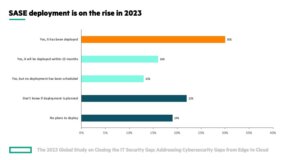
Recent research1 sent a shockwave through the cybersecurity community, exposing a worrying trend: a global surge in brute-force attacks targeting Virtual Private Networks (VPNs) since at least March 18, 2024. This blog post delves deeper into the issue and proposes a compelling alternative—Zero Trust Network Access (ZTNA)—to fortify your business network against these escalating threats.
The brutal reality of brute-force attacks in 2024
The statistics paint a concerning picture. According to a recent study by Verizon2, brute-force attacks accounted for a staggering 80% of all data breaches in 2023. This vulnerability is particularly alarming for businesses still relying on traditional VPNs, designed for a more static network environment.
Why VPNs are vulnerable in today's landscape
VPNs were built for a bygone era where the network perimeter was clearly defined and employees primarily accessed resources from within the office. Today's workforce is highly mobile, with employees accessing sensitive data from various devices and locations. This expanded access point creates a larger attack surface for malicious actors. A single compromised login credential through a brute-force attack can grant access to the entire network, potentially exposing sensitive data and causing significant financial damage.
Cisco report: Specifics of the VPN brute-force attacks
Cisco's report details the concerning aspects of these attacks:
- Indiscriminate targeting: The attacks target a wide range of VPN services, including Cisco Secure Firewall VPN, Checkpoint VPN, Fortinet VPN, and SonicWall VPN. However, the report warns that other services are likely impacted.
- Global reach: The attacks originate from TOR exit nodes and anonymizing proxies, making them difficult to track and block.
- Credential targeting: The attackers employ a combination of generic usernames and valid usernames for specific organizations, suggesting potential pre-reconnaissance efforts.
Enter ZTNA: A secure bastion against brute-force attacks
ZTNA emerges as a powerful countermeasure against the rising tide of brute-force attacks. ZTNA operates on the principle of "least privilege," a core tenet of Zero Trust Security.
Unlike VPNs, which offer blanket access to the entire network, ZTNA verifies every user and device requesting access. This verification process goes beyond simple login credentials:
- Multi-factor authentication (MFA): ZTNA often employs MFA, adding an extra layer of security by requiring a secondary verification code beyond the username and password.
- Continuous authentication: ZTNA may continuously monitor device and user posture for changes, identifying and blocking potential breaches before they occur.
Only after this rigorous verification does ZTNA grant access—but only to the specific resources the user requires for their designated task. This granular access control significantly reduces the attack surface, making it much harder for attackers to gain unauthorized access, even if they succeed in a brute-force attempt against a single credential.
Beyond security: The ZTNA advantage
While enhanced security is ZTNA's crown jewel, its benefits extend far beyond:
- Improved user experience: Gone are the days of complex VPN configurations and frustrating connection issues. ZTNA offers seamless access from any device or location, boosting user productivity.
- Reduced costs: ZTNA eliminates the need for expensive VPN hardware and licensing, leading to significant cost savings. Additionally, simplified network management translates to lower administrative overhead.
- Enhanced scalability: ZTNA effortlessly scales to accommodate a growing workforce and evolving cloud deployments.
Is ZTNA the right choice for your business?
ZTNA offers compelling advantages over legacy VPN solutions, making it ideal for businesses with:
- Large remote workforce: ZTNA's secure remote access capabilities are perfect for geographically dispersed teams.
- Highly sensitive data: ZTNA's granular access control minimizes the risk of data breaches even if attackers gain access to a single credential.
- Focus on streamlined management and user experience: ZTNA simplifies management and offers a seamless user experience for remote workers.
Conclusion
The rise in brute-force attacks signifies the limitations of traditional VPNs in today's threat landscape. ZTNA offers a more secure, scalable, and user-friendly alternative for businesses seeking to protect their networks and empower their mobile workforce.
Consider exploring ZTNA solutions and consulting with a cybersecurity expert to determine if ZTNA is the key to fortifying your business defenses against the evolving threat landscape.
1.Talos, Cisco. “Large-Scale Brute-Force Activity Targeting VPNs, SSH Services with Commonly Used Login Credentials.” Cisco Talos Blog, April 17, 2024.
2. “2023 Data Breach Investigations Report: Frequency and Cost of Social Engineering Attacks Skyrocket.” Verizon, August 9, 2023.
All third-party marks are property of their respective owners




